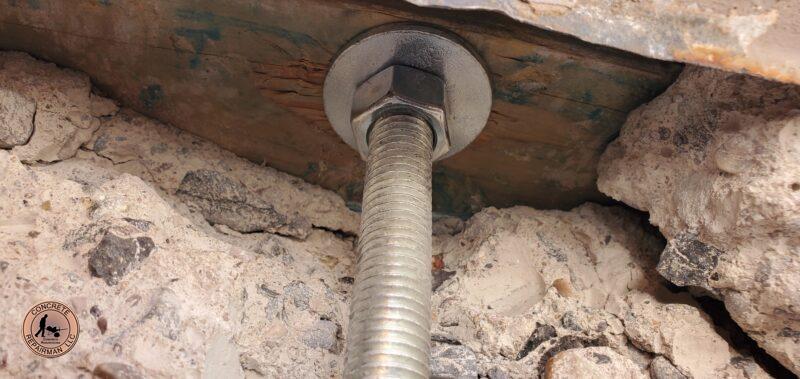Foundation Repair Concrete Repairman® We Fix It Right™
Licensed, Bonded and Insured Commercial & Residential Foundation Repair Contractors - ROC# 300512 CR-9
Foundation Repair Concrete Repairman® We Fix It Right™
Licensed, Bonded and Insured Commercial & Residential Foundation Repair Contractors - ROC# 300512 CR-9
Tempe Arizona – Scottsdale Arizona – Phoenix Arizona – Mesa Arizona – Gilbert Arizona – Chandler Arizona – Ahwatukee Arizona
Foundation Cracks – J-Bolt Anchor Replacement – Foundation Warning Signs – Ahwatukee Foundation Repair – Tempe Foundation Repair – Stem Wall Repair Tempe AZ – Stem Wall Repair Ahwatukee AZ – Concrete Repair – Glendale Foundation Repair – Mesa Foundation Repair – Crack Stitching – Oxidized Rebar – Concrete Crack Repair – Expansive Clay Soil – Foundation Settlement – Stem Wall Repair
An Anchor Bolt is a type of bolt that is used to join structural elements to non-structural ones. A wedge anchor is used for reinforcing concrete structures. A stud bolt is used to secure pipes, pumps, or support racks. There are a number of different types of anchor bolts available for various purposes. They are available in many different sizes and strengths. Listed below are some of the most common types of anchor bolts. More about foundation repair Phoenix.
To find out which one is best for a particular application, consider the size and shape of the fixture. The type of concrete will affect the type of anchor bolt you select, as will the size and location of the fixture. Depending on the finished product, you should consider the appearance of the fixture. A proper sizing is extremely important for any structural application, so consult a structural engineer if you are unsure of what to use.
The type of anchor bolt that you choose will depend on the size of the fixture and the base material. Choosing the correct size is important for many reasons. First of all, you must consider the type of concrete and what you are anchoring. Then, you must decide what you want to use. If you have no idea what type of anchor bolt you need, you can consult a structural engineer. A professional can make recommendations based on your specific needs. More about foundation repair Phoenix.
Typically, anchor bolts are installed with two different installation methods: epoxy-anchoring and cast-in-place. Cast-in-place requires you to drill through wet mortar or masonry around the braced bolts. Epoxy-anchoring involves drilling through the masonry and securing the anchor bolt to the foundation. Both methods have their advantages and disadvantages. Ensure you get the right one for the project in Phoenix.

NEW Anchor Bolt “Fidget Anchor” Foundation repair, stem wall repair J-Bolts
The placement of anchor bolts on a foundation is extremely important. You can install it yourself or hire a contractor. The building department will approve the project, but the design of the building should dictate the requirements. This can be a time-consuming process. It is also important to follow local codes and regulations. If you want to use anchor bolts, you should contact a professional to help you. The right choice will ensure a safe, secure structure. More about stem wall repair Phoenix.
If you want a secure foundation, you need a bolt with an anchor. The anchor bolts will need to be positioned properly. The positioning should be accurate and precise, and the bolts must be well aligned. If the bolts are too small, you should consider a larger diameter. In addition, you should also ensure that the hardware is secure. Incorrectly positioned bolts can cause problems, and may cause structural failure. More about stem wall repair Tempe.
The placement of anchor bolts is extremely important. When it isn’t installed correctly, the structural steel will fail. A properly placed anchor bolt can prevent structural failures. Whether it is a residential or commercial structure, you can rest assured it will be safe. The erectors of structural steel rely on accurate placement of the anchor bolts. For this reason, it is very important to have a licensed surveyor on site. Tempe, Phoenix, Mesa AZ.
The most common type of anchor bolt is the cast-in-place anchor bolt. This is the simplest and most common type of bolts. It typically consists of a standard hexagonal-shaped head and is inserted in the wet concrete before it sets. This is the strongest type of fastener. This type of bolt is commonly used to secure heavy machinery mounted on a concrete floor. These anchors are also used to connect a concrete foundation to a wall. More about concrete repair Phoenix.
The L-shaped anchor bolt is often the strongest type of anchor bolt. It is made of composite plastic and has male and female threads. They can be used for concrete or wood projects. For treated lumber, anchor bolts are recommended. The anchor bolts are sold with nuts. The size of the anchor bolt is dependent on the type of concrete. They must be suitable for the purpose for which they are used. You should also check if you have enough space for the threads.
If the load is mounted on an edge or overhead, the anchor bolt should be specified. The diameter of the bolt is determined by the weight of the load being supported. In case of light weight, you can use a smaller-diameter bolt. For heavy-duty applications, you should select a larger-diameter bolt. These types are suitable for large-scale structures that require tension ties anchor. However, they are not the only types of anchor bolt.
Chandler AZ | Gilbert AZ | Glendale AZ | Mesa AZ | Phoenix AZ | Scottsdale AZ | Tempe AZ